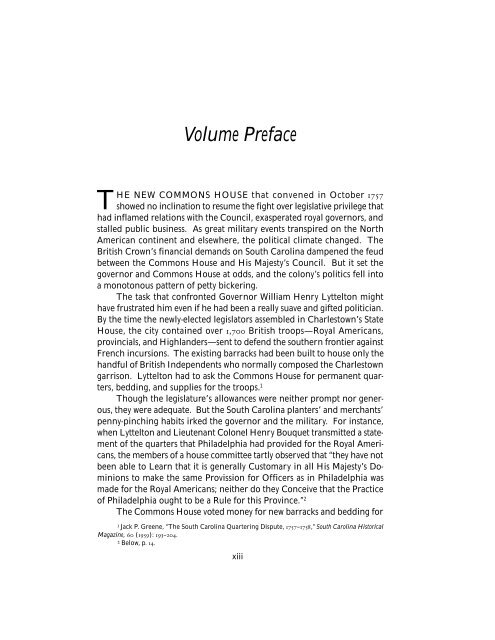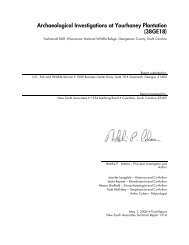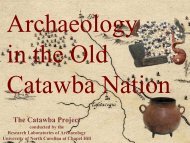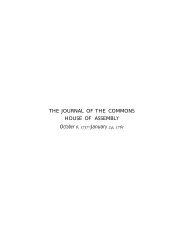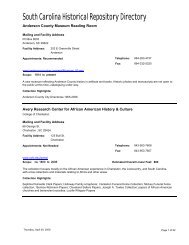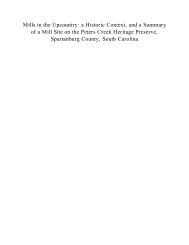The Journal of the Commons House of Assembly
The Journal of the Commons House of Assembly
The Journal of the Commons House of Assembly
Create successful ePaper yourself
Turn your PDF publications into a flip-book with our unique Google optimized e-Paper software.
Volume PrefaceTHE NEW COMMONS HOUSE that convened in October 1757showed no inclination to resume <strong>the</strong> fight over legislative privilege thathad inflamed relations with <strong>the</strong> Council, exasperated royal governors, andstalled public business. As great military events transpired on <strong>the</strong> NorthAmerican continent and elsewhere, <strong>the</strong> political climate changed. <strong>The</strong>British Crown’s financial demands on South Carolina dampened <strong>the</strong> feudbetween <strong>the</strong> <strong>Commons</strong> <strong>House</strong> and His Majesty’s Council. But it set <strong>the</strong>governor and <strong>Commons</strong> <strong>House</strong> at odds, and <strong>the</strong> colony’s politics fell intoa monotonous pattern <strong>of</strong> petty bickering.<strong>The</strong> task that confronted Governor William Henry Lyttelton mighthave frustrated him even if he had been a really suave and gifted politician.By <strong>the</strong> time <strong>the</strong> newly-elected legislators assembled in Charlestown’s State<strong>House</strong>, <strong>the</strong> city contained over 1,700 British troops—Royal Americans,provincials, and Highlanders—sent to defend <strong>the</strong> sou<strong>the</strong>rn frontier againstFrench incursions. <strong>The</strong> existing barracks had been built to house only <strong>the</strong>handful <strong>of</strong> British Independents who normally composed <strong>the</strong> Charlestowngarrison. Lyttelton had to ask <strong>the</strong> <strong>Commons</strong> <strong>House</strong> for permanent quarters,bedding, and supplies for <strong>the</strong> troops. 1Though <strong>the</strong> legislature’s allowances were nei<strong>the</strong>r prompt nor generous,<strong>the</strong>y were adequate. But <strong>the</strong> South Carolina planters’ and merchants’penny-pinching habits irked <strong>the</strong> governor and <strong>the</strong> military. For instance,when Lyttelton and Lieutenant Colonel Henry Bouquet transmitted a statement<strong>of</strong> <strong>the</strong> quarters that Philadelphia had provided for <strong>the</strong> Royal Americans,<strong>the</strong> members <strong>of</strong> a house committee tartly observed that “<strong>the</strong>y have notbeen able to Learn that it is generally Customary in all His Majesty’s Dominionsto make <strong>the</strong> same Provission for Officers as in Philadelphia wasmade for <strong>the</strong> Royal Americans; nei<strong>the</strong>r do <strong>the</strong>y Conceive that <strong>the</strong> Practice<strong>of</strong> Philadelphia ought to be a Rule for this Province.” 2<strong>The</strong> <strong>Commons</strong> <strong>House</strong> voted money for new barracks and bedding for1 Jack P. Greene, “<strong>The</strong> South Carolina Quartering Dispute, 1757–1758,” South Carolina HistoricalMagazine, 60 (1959): 193–204.2 Below, p. 14.xiii


